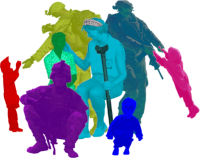One of our most critical missions is that of providing comprehensive medical care that is sensitive to the unique experiences of victims of human slavery and child trafficking. We advocate for trauma-informed care practices in all healthcare settings, ensuring that medical professionals are trained to recognize signs of trafficking and provide compassionate, non-judgmental support. This includes offering mental health services tailored to address the psychological impact of trauma, such as PTSD, anxiety, and depression.
 Training and Education
Training and Education
We work tirelessly to educate healthcare providers about the complexities of human trafficking. Our training programs focus on identifying potential victims through key indicators and understanding the cultural and psychological barriers they may face in seeking help. By equipping medical staff with this knowledge, we aim to create a network of informed professionals who can offer immediate and appropriate assistance.
 Policy Advocacy
Policy Advocacy
Our advocacy extends beyond individual care; we push for systemic changes within healthcare policies to better protect victims. We collaborate with policymakers to develop guidelines that prioritize victim safety and confidentiality, ensuring that healthcare environments are safe spaces for disclosure without fear of retribution or deportation.
 Collaboration with Health Systems
Collaboration with Health Systems
We partner with hospitals, clinics, and community health organizations to integrate specialized services for trafficking survivors into existing health systems. This includes establishing dedicated units or teams focused on providing holistic care that addresses both physical injuries and long-term health needs.
 Access to Resources
Access to Resources
Understanding the barriers victims face in accessing healthcare, we strive to eliminate these obstacles by advocating for free or low-cost medical services. We also facilitate connections between survivors and local resources, including shelters, legal aid, and social services, ensuring a continuum of care that supports their recovery journey.
 Empowerment Through Health Education
Empowerment Through Health Education
Empowering survivors through education is a cornerstone of our approach. We provide workshops on health literacy, helping individuals understand their rights within the healthcare system and how to advocate for themselves effectively. This empowerment is crucial in fostering independence and resilience among survivors.
By addressing the health needs of trafficking victims at every level—from individual care to policy reform—we are committed to creating a world where survivors receive the respect, dignity, and support they deserve.
